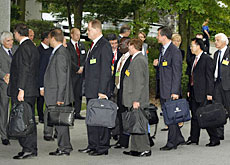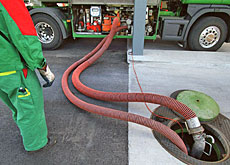Climate warning resonates in Switzerland

Economists and climatologists in Switzerland hope a hard-hitting report on the threat of climate change will lead to renewed action on global warming.
The report by former World Bank chief economist Nicholas Stern, published on Monday, warns that failure to act could cost the global economy trillions of dollars.
Stern forecast that the world’s economy could shrink by up to 20 per cent unless one per cent of global output was spent on reducing emissions by 2050. The report has been described in some quarters as a “turning point” in the debate on climate change.
Martin Beniston, head of climatology at Geneva University, told swissinfo that the Stern Review was the first significant global economic analysis of climate change.
“We are going beyond hammering the fact that if we go on like this… there will be major upsets in various aspects of the global environment,” he said. “The message has actually gone beyond the scientific community and is now going into economic circles.”
Beniston welcomed the fact that recent trends in oil prices had already made firms sit up and think twice about energy consumption, independently of any awareness of climate change and other environmental issues.
He said the importance of industry and the economy taking the lead on climate change could not be overstated – as was the fact that the 580-page report had been compiled by a former chief economist of the World Bank.
“It will have a positive influence in getting those firms or businesses who were on the verge of wondering whether to do something about this or not, and might tip them in the right direction,” he said.
Close scrutiny
Markus Nauser, senior scientific adviser in the Federal Environment Office’s climate unit, agreed that the report was an important one and would be studied closely by the Swiss government.
“I think it’s a great contribution to the discussion. It comes up with figures that we hadn’t had in that form before and it supports our own analysis,” he said.
Nauser said he expected it would have an impact on the way business looked at climate change and the need to pursue alternative technologies and energy sources.
“I think part of business is already well aware of the risks involved in climate change,” he said. “If you look at the insurance business, all the major reinsurance companies have been very active [in this field] for a very long time. They have been followed by many others who can also see the business opportunities of developing new technologies.”
According to Nauser, the Federal Environment Office is in the process of compiling its own study of the economic impact of global warming for Switzerland.
He said this would give the government an idea of the costs of inaction in order to develop “the right balance of mitigation versus adaptation measures”.
Reducing emissions
Urs Näf, responsible for energy and environment issues at the Swiss Business Federation, economiesuisse, also concurred with the “diagnosis” of the Stern Review.
He said the challenge now was to work out how to proceed and ensure all countries participated in reducing emissions.
Näf claimed that unilateral efforts to combat global warming meant that firms in some countries were handicapped by targets while others were not, creating what he described as “trade distortion”.
“Nobody wants unilateral commitments that only hamper their own growth and business,” he said. “We need a global approach, with every country signed up.”
Näf pointed to the creation of the Climate Cent Foundation as an example of where the Swiss business community had already taken voluntary action.
The foundation, launched in October last year, invests annual revenues of SFr100 million ($80.5 million) in projects designed to reduce greenhouse gas emissions both in Switzerland and abroad. The money is generated by a 1.5-centime levy on each litre of imported petrol and diesel.
swissinfo, Adam Beaumont
Switzerland has pledged a 10% reduction in CO2 levels by 2010.
The Swiss CO2 law formally took effect in 2000 and foresees additional measures if targets cannot be met by voluntary means.
Last October the authorities agreed to introduce a levy on petrol and diesel on a trial basis, following opposition against a mandatory CO2 emission tax.
Failure to tackle climate change could push world temperatures up by 5 degrees Celsius over the next century, causing severe floods and droughts and potentially displacing as many as 200 million people.
The report estimates that stabilising greenhouse gases in the atmosphere will cost about 1% of annual global output by 2050. Inaction, however, could cut global consumption per person by between 5% and 20%.
It says the world must move to a low-carbon emitting global economy and governments must price carbon emissions through taxation and regulation. Development of low-carbon and high-efficiency technology will also be vital.
The report precedes UN climate talks in Nairobi next week aimed at finding a successor to the Kyoto protocol, which runs out in 2012.

In compliance with the JTI standards
More: SWI swissinfo.ch certified by the Journalism Trust Initiative


You can find an overview of ongoing debates with our journalists here. Please join us!
If you want to start a conversation about a topic raised in this article or want to report factual errors, email us at english@swissinfo.ch.